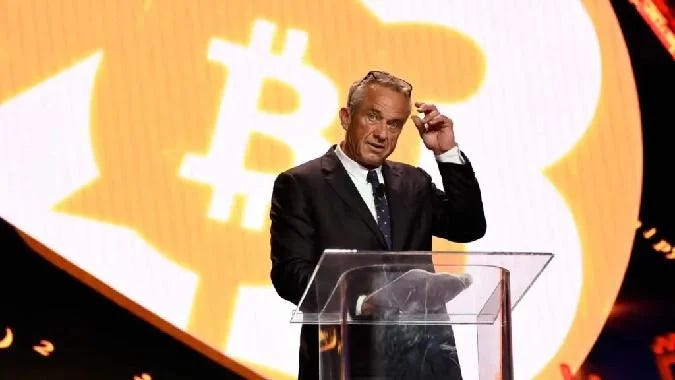Bitcoin Key to Dollar Stability: Kennedy Jr. Urges US to Hold 4 Million BTC Reserve
The upcoming United States Presidential election has seen Bitcoin emerge as a significant topic of discussion among major political figures. Republican presidential candidate Robert F. Kennedy Jr. has made waves by proposing a radical financial strategy involving Bitcoin, a digital asset that has been both lauded and criticized.
Kennedy's proposal centers on incorporating Bitcoin as a strategic reserve asset for the United States, a move he believes could bolster the stability and resilience of the US dollar.
This article explores the implications of Kennedy's proposal and its potential impact on the US economy.

Kennedy Jr.'s Bold Proposal: A Strategic Reserve of Bitcoin
At the Bitcoin 2024 conference, Robert F. Kennedy Jr. articulated his vision for integrating Bitcoin into the US financial system. He proposed that the United States government should not only hold its existing Bitcoin assets but also significantly increase its holdings.
According to Kennedy, the Department of Justice and the US Marshals currently hold approximately 200,000 BTC, which he suggests should be transferred to the US Treasury to be held as a strategic reserve asset.
Kennedy's plan doesn't stop there. He advocates for the acquisition of an additional 550 BTC daily until the United States amasses a reserve of at least 4 million BTC. This ambitious goal is positioned as a parallel to the country's gold reserves, which account for approximately 19% of the world's total.
Kennedy sees this strategy as a way to enhance the US dollar's stability, suggesting that Bitcoin, like gold, could serve as a hedge against economic instability and inflation.
The Potential Impact on the US Dollar
Kennedy argues that incorporating Bitcoin into the nation's reserves could have a stabilizing effect on the US dollar. Bitcoin's limited supply and decentralized nature offer a stark contrast to fiat currencies, which can be subject to inflationary pressures due to government policies.
By holding Bitcoin, the US could protect its currency from these pressures, potentially making the dollar more resilient in times of economic uncertainty.
The idea of using Bitcoin as a reserve asset is not without precedent. Some countries and corporations have already begun to hold Bitcoin as a hedge against inflation and currency devaluation. However, Kennedy's proposal is unprecedented in its scale and ambition, suggesting that the US could become a global leader in adopting digital assets as part of its financial strategy.
The Broader Implications for the US Economy
Kennedy's proposal also highlights a broader vision for the role of digital currencies in the US economy. He envisions Bitcoin as a technology for freedom, optimism, independence, democracy, and transparency. This view positions Bitcoin not merely as an asset but as a symbol of a new era of innovation and technological advancement.
Furthermore, by adopting Bitcoin as a reserve asset, Kennedy believes the US could solidify its leadership in cyberspace and the global digital economy. This move could attract technological investment and talent, fostering innovation and potentially positioning the US as a hub for blockchain and cryptocurrency development.
However, such a dramatic shift in financial policy would not come without risks. Bitcoin's price volatility could pose significant challenges, both in terms of managing the national reserve and maintaining economic stability. Additionally, the legal and regulatory framework for cryptocurrencies in the US would need to be robustly developed to manage the complexities associated with widespread adoption.
The Political Dimension: Rival Proposals and Future Directions
Kennedy's proposal has also stirred political discourse, with other figures weighing in on the role of Bitcoin in the national economy. Notably, former President Donald Trump has expressed interest in the idea, suggesting that the US government could consider purchasing 1 million BTC as a strategic reserve asset. This bipartisan interest indicates a growing recognition of the potential significance of digital currencies.
Kennedy has expressed caution, however, noting that political motivations could sometimes overshadow genuine interest in the technology's benefits. He stresses the importance of understanding Bitcoin's potential to protect the US financial system and individuals against cyber dangers, rather than merely seeing it as a tool for political gain.
Conclusion
Robert F. Kennedy Jr.'s proposal to hold Bitcoin as a strategic reserve asset represents a bold vision for the future of the US economy. By suggesting the acquisition of 4 million BTC, Kennedy positions Bitcoin as a potential pillar of financial stability and innovation. While the proposal raises numerous questions and challenges, it also highlights the evolving discourse around digital currencies and their role in modern economies. As the election approaches, the debate around Bitcoin's place in the national reserve continues to gain momentum, promising to be a significant issue in the future of US economic policy.
Sources
- Bitcoinist: RFK Urges US to Hold 4 Million Bitcoin Reserve
- The Guardian: Bitcoin's Role in the Future of Finance
- BBC: The Debate Over Bitcoin's Place in National Reserves




































